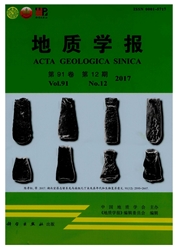

 中文摘要:
中文摘要:
本文从江西德兴斑岩铜矿铜厂矿床的流体包裹体研究出发,讨论了矿床成矿物质来源与矿床成因。矿床中流体包裹体分为6类,即富液包裹体、富气包裹体、含石盐多相包裹体、含CO2多相包裹体以及熔体包裹体和熔体-流体包裹体。富气包裹体、含石盐多相包裹体和熔体与熔体-流体包裹体代表了成矿早期岩浆热液的特征。在这些包裹体中发现黄铜矿等金属矿物,表明成矿金属主要源自岩浆。含石盐多相包裹体和富气包裹体与矿体关系不甚密切,但其中所含有的金属矿物特别是黄铜矿,暗示早期来自岩浆的热液流体金属含量较高,形成于大气降水与岩浆热液混合之前。成矿中晚期大气降水流体在冷却和稀释岩浆流体方面对于矿床的形成作出了一定贡献,但是来自围岩的大气降水可能并没有向成矿体系提供大量金属。
 英文摘要:
英文摘要:
Based on fluid inclusion study, this paper made further discussions on the source of ore-forming materials and ore genesis of the Dexing porphyry copper deposit, Jiangxi Province. On the basis of optical observations, six different types of fluid and silicate melt inclusions in quartz phenocrysts and quartz veins were recognized, liquid+vapor, liquid-rich, low-salinity inclusions; liquid+vapor, vapor-rich, lowsalinity inclusions; halite-bearing multiphase, hypersalinity inclusions; CO2-bearing inclusions; melt-fluid inclusions that contain one or more crystalline phases and vapor; Melt inclusions consist of a cluster of small crystals, partially devitrified glass. The high-salinity, halite-bearing inclusions and vapor-rich inclusions are common in quartz phenocrysts and early veins and characterize the early high-salinity and high-temperature of magmatic fluid. The fluid and melt inclusions in the quartz phenocrysts and veins in granodiorite porphyry and in the quartz of ore-bearing quartz veins contain a triangular opaque phase, identified as the phase of chalcopyrite using Raman spectroscopy. As these inclusions were formed from magmatic fluids before the incursion of wallrock-sourced meteoric fluids into the pluton, the metals in the inclusions could not have been derived by leaching of wallrocks by meteoric fluids. Although meteoric fluids play an important role in the genesis of the porphyry copper deposit by cooling and diluting the magmatic fluid, the wallrock-derived fluids may not have contributed significant metals to the ore system.
 同期刊论文项目
同期刊论文项目
 同项目期刊论文
同项目期刊论文
 期刊信息
期刊信息
